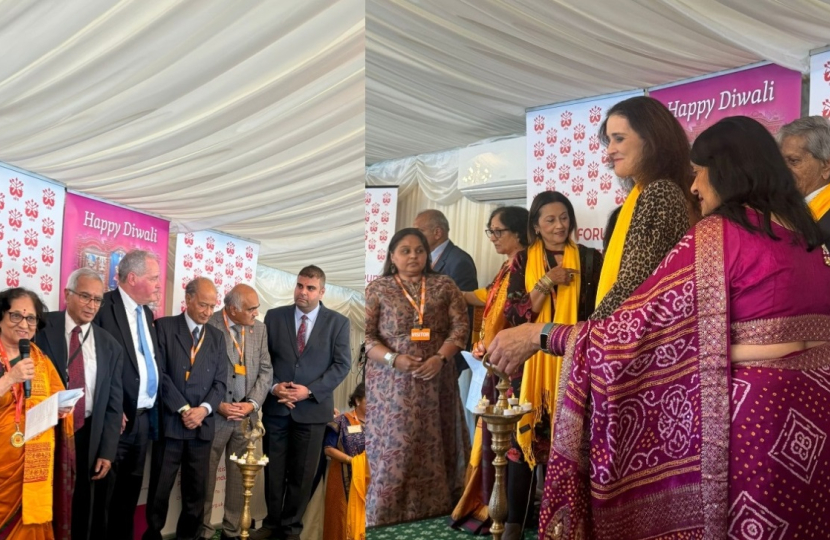
The following article was recently published on the website of educational consultants, Finito World, in which Theresa highlights to increasingly important role on the world stage that India is likely to play over the decades to come. Theresa has a longstanding interest in India and raised matters relevant to the country in Parliament during her time as MP for Chipping Barnet:
"I believe this will be an Indian century and if the UK is going to seize the opportunities that presents, we need to step up our engagement with India.
In my former role as MP for Barnet, I was privileged to represent a significant British Indian community. This has left me with an enduring enthusiasm for India.
The country has made phenomenal economic progress over recent years, with growth accelerated by reforms delivered by the Prime Minister Modi’s Government. It is already an economic superpower. It recently became the fifth largest economy in the world, and analysts predict it could overtake Germany and Japan to hit the third place spot by 2027.
India is well-positioned to take advantage of the growing realization in the west that over-dependence on China poses serious risks our prosperity and security. The Covid pandemic starkly demonstrated the pressing need to diversify global supply chains and reduce reliance on China. That makes India a more important partner than ever before.
Our two countries clearly have much in common. English continues to be one of India’s most important official languages. The principle of rule of law is accepted, and the common law system in operation when India gained its independence remains in use.
Despite these positive legacies of empire, we should not be naïve about the colonial era. In their near 200 year involvement with India, the British authorities frequently adopted approaches which would be unacceptable in the modern era. Tragedies such as the 1919 killings at Jallianwala Bagh, when soldiers opened fire on a crowd of unarmed protesters, still cause pain and grievance even today.
But 77 years on from the departure of the British from India, the contested aspects of our shared past should not prevent us from capitalizing on the huge amount that we have in common.
We should also remember that influence has never been a one way street between our two countries. We may have left India a rail network and a legal system, but they gave us the numerals we use today, including the crucial concept of zero.
Without Indian maths we might never have emerged from the Middle Ages in Europe. India’s massive cultural, mathematic and scientific influence on the world dates from as far back as the Greek and Roman era. There should be a much greater awareness of this, and I welcome William Dalrymple’s effort to put that right in his recent book “The Golden Road”.
A great asset in enabling us to connect with the subcontinent is the Indian diaspora community. Often described as our ‘living bridge’, this community is one of the most successful minorities in Britain. Numbering just under two million according to the 2021 Census, it has strikingly high rates of professional qualifications and employment, and has made a huge contribution to the UK’s culture, economy and public services. Not only did the community give us our first non-white Prime Minister, the NHS would probably collapse without its British Indian doctors!
British Indians have achieved an exemplary balance of integrating enthusiastically into UK society, whilst retaining a vibrant cultural and religious identity. This achievement is too often under-rated and overlooked.
There are risks to be managed and hurdles to surmount when doing business in India. Despite the improvements delivered by “Modinomics”, bureaucratic processes can still be cumbersome.
Even so, India-UK bilateral trade stood at £36.3 billion during the year 2022/23, an increase of 34.2% or £9.2 billion compared the previous year. Moreover, our universities have benefited from a rapid increase in overseas students from India.
A striking example of the two countries working together successfully was the partnership between Oxford University, AstraZeneca, and Serum Institute of India, which delivered a Covid vaccine in record time.
In conclusion, in a world which is becoming increasingly polarized and insecure, strengthening our ties with the planet’s biggest democracy should be a top foreign and trade policy priority.
If the UK wants to benefit from Indian prospects and potential over the coming years we need our Government to devote real effort to this. If we don’t put in that work, other western countries will be only too happy to get ahead of us in the queue.
We should to deploy the networks of our Indian diaspora community as part of our outreach. We also need a pragmatic approach to visas, so our world class universities can continue to recruit talented Indian students.
And we should actively promote India’s place at the top table of world affairs. Chairing the G20 summit in 2023 was a pivotal moment when India stepped up and assumed a new leadership role in relation to the Global South. As a democratic country that shares so many of our values, far better that India, not China, takes on that mantle."

